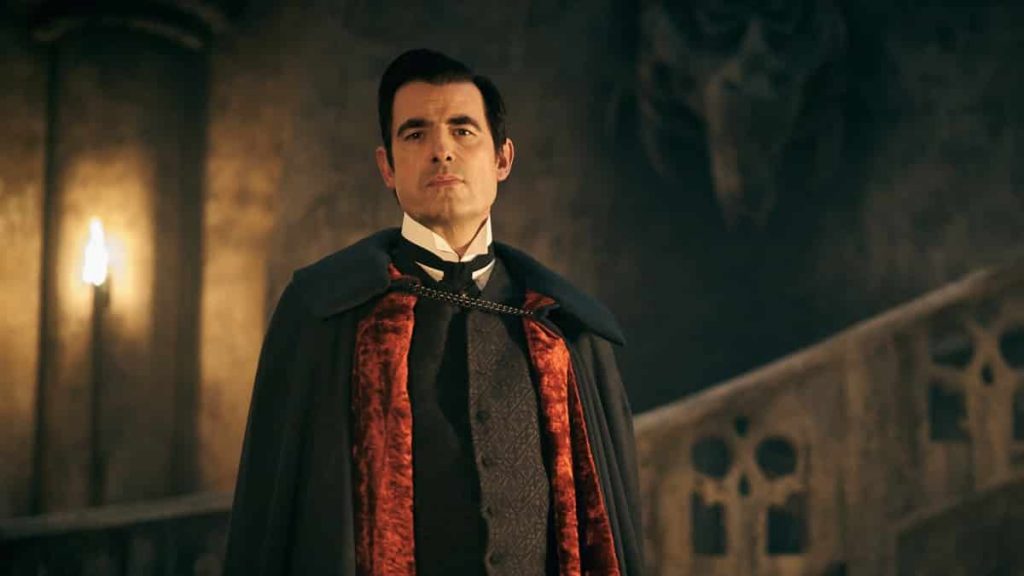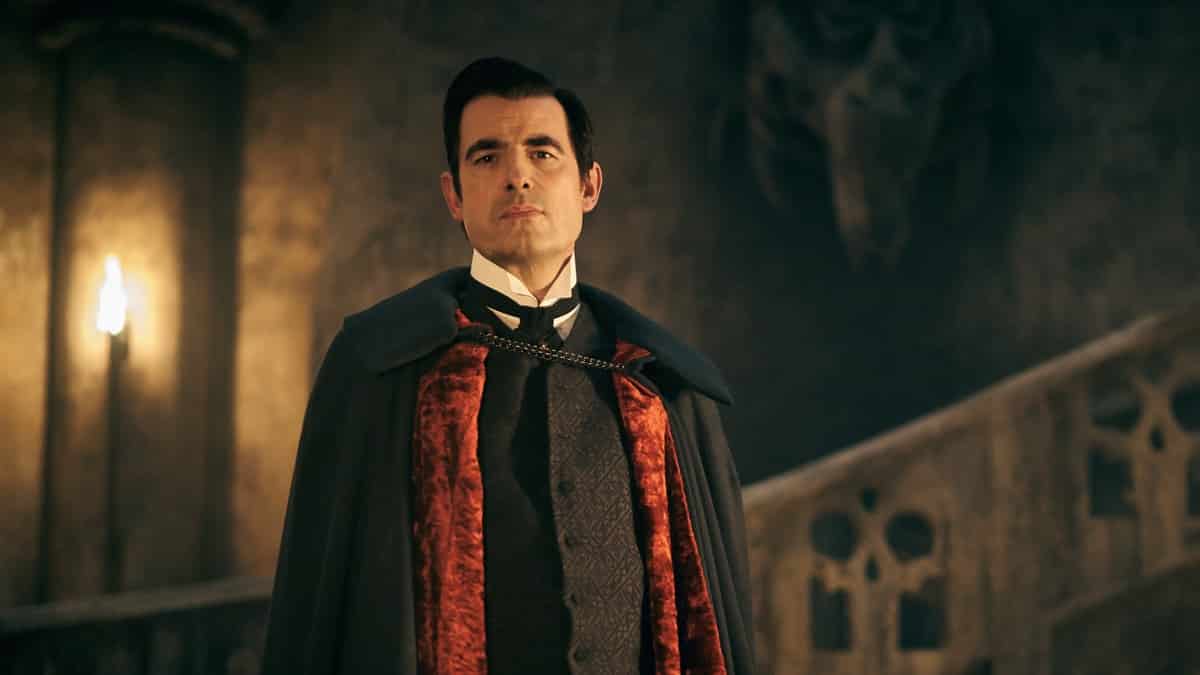CHRIS NEWTON reviews the first episode of the Steven Moffat-Mark Gatiss adaptation of the Bram Stoker classic, Dracula
The latest incarnation of Dracula from the BBC begins faithfully enough to Stoker’s 1897 novel, with fearful locals insisting that John Heffernan’s Jonathan Harker take a crucifix with him to Castle Dracula, as he arrives to discuss the count’s purchase of Carfax Abbey. But its denouement of stake wielding nuns is a rip-roaring adventure that has more in common with Hammer than Stoker.
In the space of an hour and a half, ‘The Rules of the Beast’ transformed from something enjoyably familiar to something new and interesting. But did it work?
This close to transmission, I shall try to remain largely spoiler-free. But here are three things I thought it did well, and one thing it didn’t.
1. The Atmosphere
The overall look of Castle Dracula and its surroundings were incredible. Dare I say it gives Francis Fore Coppola a run for his money?
The labyrinthine interior of the castle reminded me more than a little of Steven Moffat’s 2015 Doctor Who masterpiece ‘Heaven Sent’.
In our ‘What Can we Expect of Dracula?’ article, we promised a soundtrack to die for, and David Arnold and Michael Price didn’t disappoint, from creeping mood pieces as Harker sits down to dinner with the count, to satanic stabbing strings as he uncovers the horrors of the castle crypt.

The traditional orchestration was mixed with more experimental approaches, including samples of screaming babies and slamming coffins. You’ve heard of glass harps? Where the musician wets a finger and creates sound by rubbing it around the rim of a wine glass? In true vampiric fashion, Dracula’s composers reputedly used glasses of real blood.
2. The Practical Effects
If anything, this was probably the most surprising – and most enjoyable – aspect of last night’s episode for me.
The twisted, jerking limbs of the undead in the basement put me in mind of Jason and the Argonauts’ skeleton army, with other visual horrors invoking the grand guignol Of Evil Dead.
Check out the BBC’s YouTube for their behind the scenes video below of how they achieved the wolf transformation scene – a refreshingly fun blend of puppetry, actual contortionists and makeup to create an effect that wouldn’t have anywhere near as much punch had the effect been digital.
I’m sure it’ll have given plenty of younger viewers nightmares, which is great, if Mark Gatiss hadn’t been so traumatised by Hammer as a young boy, he wouldn’t have grown up to make half of the wonderful things he did.
3. Sister Agatha
Dolly Wells is by far the best thing about this series so far.
In promotional interviews, the writers claimed they were making ‘the bad guy’ the main character. Was that a red herring?
This episode starts, just like the book, as Harker’s story, but by the end it’s very much Agatha’s.
Her curiosity with the powers of darkness, to the point where she’s willing to put herself and others in danger to prove a theory (see opening the convent gates to Dracula just to see if it’s true that he can’t enter without an invitation) gives her a slight Doctor-ishness, hardly surprising given the writers, but it makes her interesting in that, whilst she’s definitely on the side of good, she has an unnerving unpredictability that doesn’t make you feel particularly safe around her.
The best thing about Agatha is the exploration of her faith, or lack thereof. Her description of her relationship with God is one of the best lines in the episode: ‘like many women of my age I am trapped in a loveless marriage for the sake of a roof over my head.’
Aside the obligatory recoiling from crucifixes, it’s something that often isn’t really explored in vampire movies. But if Dracula is an acolyte of Satan, it stands to reason that God exists also. As is to be expected from Gatiss and Moffat, there is more to Agatha than meets the eye, but if you were really paying attention, you’d have guessed that from her accent…
So far so good, but there’s one fairly crucial element I’ve not mentioned much, and I’m afraid it’s the one thing that didn’t work for me.
4. Dracula
Claes Bang is wearing the costume, he’s got the fangs… But I’m just not getting any of the charm or charisma I expect from the count.
He just feels like someone’s dad in a Halloween cape, and is altogether more Pierce Brosnan than Gary Oldman. And I don’t even mean James Bond Brosnan, more Mrs. Doubtfire Brosnan.
Despite the brilliantly creepy prosthetics of his early scenes, his Transylvanian sounds bizarre, and his later English accent is just weird. Why has his accent changed? They seem to imply that Dracula is leeching Harker’s very identity as well as his life force in order to better fit into English society for his impending journey, but in that case would he not speak as Harker does?
Clipped, formal and upper-class? Bang’s Dracula speaks – for want of a better term – like a geezer.
But maybe it’s just me. The initial reviews seem fairly enthusiastic about Bang. And, like James Bond or Doctor Who, it’s often impossible to accept an actor in a role that’s already become a cultural icon in various guises for various generations.
Had I never seen Bela Lugosi, or Christopher Lee, or Gary Oldman, I might accept Bang as a great interpretation of Stoker’s character. Or would I?
We suggested a healthy dose of irreverence regarding the source material, and that’s exactly what we got. (Jonathan Harker’s story in particular might not go where you think it’s going.)
But whilst a lot of Dracula’s actions and dialogue mirror the novel, the BBC’s Dracula is a very different beast. Beast being the operative word here, Bang’s Dracula is an altogether more feral creature than previous interpretations. There has always been a bestial nature to Dracula – just like Mr Hyde, he epitomises the animalistic sexuality so suppressed by the Victorian values that produced them – but it lay beneath the refinement of an aristocrat.
There was one thing that niggled me, and I think it ties into this.
There is a scene in which Dracula is invited in by pretending to be somebody else. It’s a great scene in its own right, with some brilliant gore, but that’s not the point. We all know that Vampires can’t come in unless they’re invited. But what does that actually mean? It’s not just that they’re really polite. Dracula, indeed vampires generally, have always been about suppressed desire. Dracula’s greatest weapon is not his fangs, or his strength, or his shape-shifting, it’s his ability to make you want him. That’s the genius of the vampire: they can’t come in uninvited, but on some subconscious level we want to let them in, and so they’ve already won. That’s what the ‘invitation’ is, your inherent desire for them. Consider the raw sexuality of the scene in 1958’s Dracula when Lucy removes her crucifix and opens the terrace windows before lying on the bed with her neck bared. A scene like that has much more subversive power than Dracula wearing a mask and simply tricking his way in. It seems like a small nit-pick of one scene in a feature length episode, but it seems to sum up Bang’s character. Nobody surrendered to his desire, he simply forced his way in.
Perhaps it’ll just take me some time to get used to this new interpretation of the character. I’ll certainly be tuning into tonight’s episode because I want to know what happens next, but at the moment I’m mainly watching for Sister Agatha.
Read the Dracula BBC Complete Episode Guide here.
Check out Chris Newton’s new gothic thriller, Convent Cresent available as Ebook or Hardback.



